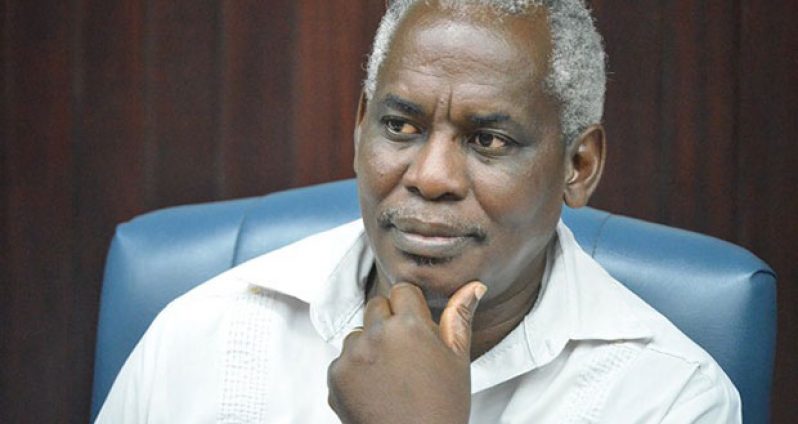POLITICAL challenges over contentions related to Government spending, under a prorogued Parliament, were answered with an emphatic one-line defence by Public Works Minister, Robeson Benn on Thursday at the fifth annual engineering conference.
The minister, under whose purview investments into several of major infrastructural undertakings were made, said: “I am prepared to go to jail for any reason related to Guyana’s proper development, for any reason.”
He declared emphatically that he stands with colleague, Dr. Ashni Singh, the Minister of Finance.
“I stand in support of Minister Ashni Singh, who has found the way to allow the expenditure to be made so that our country’s development does not falter and so that our economy does not go into recession,” Benn said.
The Public Works Minister reasoned that Government spending constitutes the largest sum of expenditure into the national economy.
“The payment of wages and salaries, the purchase of fuel and other things, in relation to our development efforts, has a lot to do with the work of the Government,” he said.
Benn alluded to the fact that Guyana has experienced real economic growth every year, for eight consecutive years.
“The fact that Guyana has had eight years of year on year growth is important when we consider where we have come from…we must have growth, continued development and progress in our country, irrespective of which political side we are on,” he stressed.
GUARDED SPENDING
On the question of spending, until the dissolution of Parliament, Attorney General, Anil Nandlall, has underscored the legal provisions which guard spending and ensure these are done without ‘abuse’, as is being alleged.
With the May 11 elections announcement, Parliament is expected to be dissolved before that. As such, spending is governed by Article 220 (3) of the Constitution.
Once Parliament is dissolved, the relative proclamation will activate the provisions of Article 220 paragraph 3, which states that if Parliament is dissolved before any actions are taken to authorise monies from public funds, “The minister responsible for finance may authorise the withdrawal of such sums from the Consolidated Fund.”
The minister must, however, prove that monies taken from the Consolidated Fund are used for the purpose “of meeting expenditure on the public services.”
The Consolidated Fund in normal circumstances could be accessed only by support from the National Assembly.
The procedure follows that after the new Parliament meets, a statement must be presented to the National Assembly by the Finance Minister or any other minister who was identified by the President. “When the statement has been approved by the Assembly, that expenditure shall be included, under the appropriate heads, in the next Appropriation Bill,” the legislation also reads.
Until Parliament is dissolved, it currently still stands under prorogation – following the November 10 proclamation by President Ramotar.
During this period, there are also laws that govern Government spending.
According to the Attorney General and Minister of Legal Affairs, Anil Nandlall, a combination of Article 219 of the Constitution and the Fiscal Management and Accountability Act, provides that in any financial year the Government is empowered to spend one twelfth of the Budget of the preceding year in continuing to provide the normal services of the Government of Guyana, until an Appropriation Act is passed.
“This position obtains, whether Parliament is in session or not, or whether there will be Elections or no Elections. Indeed, if Parliament was in session, the National Assembly could not have prevented this constitutional and legal formula in relation to spending during this period (before the new Budget is passed) from being applied,” Nandlall said.
(By Vanessa Narine)



.jpg)








